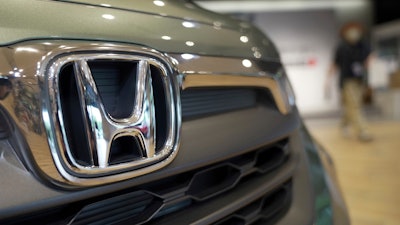
DETROIT (AP) — Honda and the U.S. government are urging owners of about 8,200 older vehicles not to drive them until dangerous air bag inflators are replaced.
The National Highway Traffic Safety Administration on Friday issued a "Do Not Drive" advisory for the 2001 through 2003 vehicles with Takata inflators that have a high possibility of exploding and hurling shrapnel in a crash.
The safety agency says the risk to drivers and passengers is dire because the so-called "Alpha" inflators have a 50% chance of exploding in a crash. If the inflators blow apart, they can shoot shrapnel toward a driver's face that could kill them or cause serious injuries.
The agency says the Honda and Acura vehicles were recalled previously but records show that repairs have not been made in the affected vehicles. Honda already has replaced 99% of the dangerous inflators.
Vehicles affected include the 2001 and 2002 Honda Accord and Civic, the 2002Honda CR-V and Odyssey SUVs, the 2003 Honda Pilot, the 2002 and 2003 Acura 3.2 TL and the 2003 Acura 3.2 CL.
Owners can check to see if their cars are covered by going to https://www.nhtsa.gov/recalls and keying in their 17-digit vehicle identification number.
"These inflators are two decades old now, and they pose a 50% chance of rupturing in even a minor crash," NHTSA Acting Administrator Ann Carlson said in a statement. "Don't gamble with your life or the life of someone you love – schedule your free repair today before it's too late."
Takata used ammonium nitrate to create a small explosion to inflate air bags in a crash. But the chemical can become more volatile over time when exposed to moisture in the air and repeated high temperatures. The explosion can rupture a metal canister and hurl shrapnel into the passenger compartment.
Since 2009, the exploding air bags have killed at least 33 people worldwide, including 24 in the United States.
Most of the deaths and about 400 injuries have happened in U.S., but they also have occurred in Australia and Malaysia.
Honda said it has reached out to the owners more than 18 million times with mailed notices, emails, phone calls and even home visits. The company says repairs are free and parts are available. It's offering free towing and loaner vehicles if needed.
Potential for the dangerous malfunction led to the largest series of auto recalls in U.S. history, with at least 67 million Takata inflators recalled. The U.S. government says that millions have not been repaired. About 100 million inflators have been recalled worldwide. The exploding air bags sent Takata Corp. of Japan into bankruptcy.
Honda by far had the highest number of vehicles with Takata inflators.






















